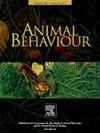Behavioural thermoregulation compensates for changes in solar insolation in a wild insect
IF 2.3
2区 生物学
Q2 BEHAVIORAL SCIENCES
引用次数: 0
Abstract
Knowledge of how animals use behaviour to adapt to changing environmental conditions is important for understanding how they will be impacted by climate change. Rising global temperatures are increasing the moisture-holding capacity of air, leading to greater cloud cover, which attenuates shortwave radiation, reducing the amount of radiation reaching animals on the ground. We experimentally investigated how changes in cloud cover may impact ectotherms that bask in sunshine to regulate their body temperature. We manipulated the degree of shade experienced by an annual insect, the field cricket, Gryllus campestris, under natural and seminatural conditions. Shading nymphs in large field boxes did not affect development time and had only a small negative effect on mass at maturity. To investigate whether crickets were able to compensate for increased shade through changes in their behaviour, we monitored the activity of experimentally shaded and unshaded wild cricket nymphs. Unshaded nymphs sought shade at midday, whereas shaded nymphs basked throughout the day in the most sunlit positions. Most ectotherms are profoundly affected by the energy they receive from sunlight. Our findings suggest that mobile ectotherms may be able to compensate for changes in cloud cover. However, they may incur costs due to greater exposure to threats such as predation. Understanding behavioural flexibility and the costs and benefits of different strategies is required to make accurate predictions about how terrestrial ecosystems will be impacted by changing solar insolation due to climate change.
野生昆虫的行为体温调节可补偿太阳日照的变化
了解动物如何利用行为来适应不断变化的环境条件,对于了解它们将如何受到气候变化的影响非常重要。全球气温上升使空气的含水量增加,导致云量增加,从而衰减了短波辐射,减少了到达地面动物的辐射量。我们通过实验研究了云层的变化会如何影响那些通过沐浴阳光来调节体温的外温动物。我们在自然和半自然条件下操纵了一年生昆虫田蟋的遮阴程度。在大型田间箱中遮蔽若虫不会影响发育时间,对成熟时的质量也只有很小的负面影响。为了研究蟋蟀是否能够通过改变行为来补偿遮荫的增加,我们监测了实验中被遮荫和未被遮荫的野生蟋蟀若虫的活动。未受遮蔽的若虫在正午时寻找阴凉处,而受遮蔽的若虫则全天都在阳光最充足的位置晒太阳。大多数外温动物都会受到它们从阳光中获得的能量的深刻影响。我们的研究结果表明,移动的外温动物可能能够补偿云层的变化。不过,它们可能会因为更容易受到捕食等威胁而付出代价。要准确预测陆地生态系统将如何受到气候变化引起的太阳日照变化的影响,就必须了解行为的灵活性以及不同策略的成本和收益。
本文章由计算机程序翻译,如有差异,请以英文原文为准。
求助全文
约1分钟内获得全文
求助全文
来源期刊

Animal Behaviour
生物-动物学
CiteScore
4.60
自引率
8.00%
发文量
236
审稿时长
10.2 weeks
期刊介绍:
Growing interest in behavioural biology and the international reputation of Animal Behaviour prompted an expansion to monthly publication in 1989. Animal Behaviour continues to be the journal of choice for biologists, ethologists, psychologists, physiologists, and veterinarians with an interest in the subject.
 求助内容:
求助内容: 应助结果提醒方式:
应助结果提醒方式:


